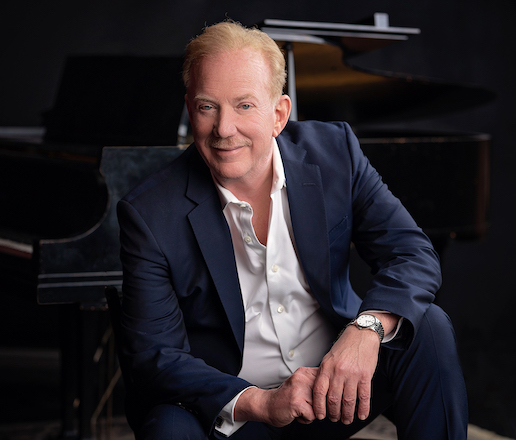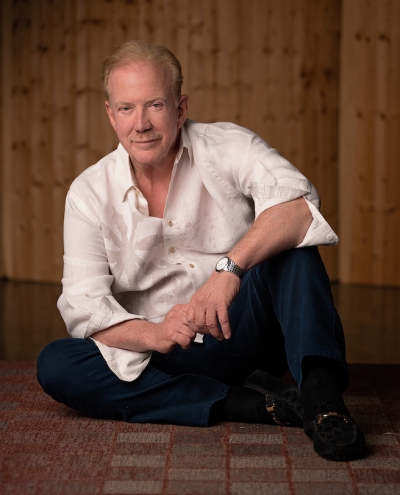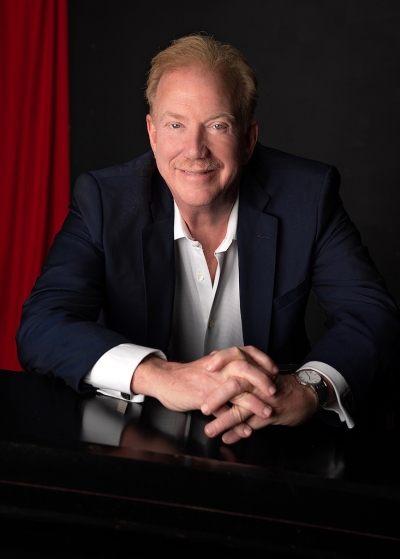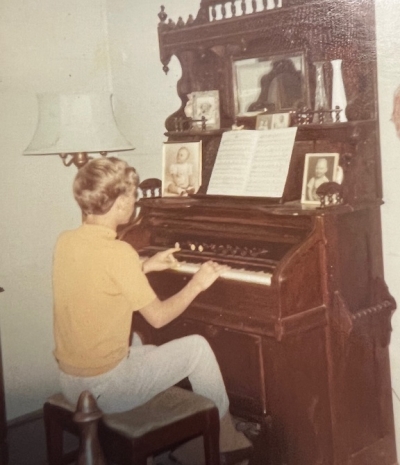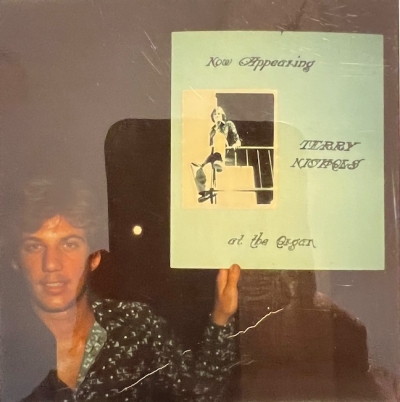Terry Lee Nichols recently released his fourth album,
Metamorphosis - an extraordinary work that covers a lot of very emotional territory. All four of Terry's albums have been very powerful both musically and in expressing a variety of messages, but
Metamorphosis seems to be especially personal. In this very candid interview, Terry explains where the music came from and how he went about creating it. I hope you will enjoy getting to know Terry a little better as much as I have!
KP: Hi Terry! How is everything in Florida today?
TLN: It is a sunny, warm day in the month of May!
KP: I recently reviewed your fourth album, Metamorphosis, and I have to say that it blew me away, as have all four of your albums. How is it doing so far?
TLN: It is just getting started. I am in the process of selecting a marketing firm to promote it. I hope to get air play on SXM Spa, Echoes Radio, streaming stations, airlines, and overhead music companies.
KP: Good luck with that! Promoting a new album is a LOT of work!
Your previous albums were piano-based but were much more orchestrated. This one is all piano with some effects created inside and outside the piano. I think it really demonstrates what an amazing pianist you are. Did the music dictate that this album should be "solo," or did you have other reasons for making this one all piano?

Click on album covers to go to
Kathy's reviews.
TLN: The idea for a solo piano album rose up from the ashes of my divorce. I moved to a smaller home on the ocean, and began a period of introspection. Eventually, I decided to create an album that reflected the broad span of time that brought me to where I am today. With piano, I was able express intimate feelings and events. It has been my principal voice since childhood, and was really my only choice for such a personal journey.
KP: I guess you could say that much of the album is kind of a soliloquy. It feels so deeply personal and honest, as well as emotional.
It's kind of an interesting coincidence that I recently reviewed Nic Gerpe's Makrokosmos 50 Project, which commemorates the 50th anniversary of George Crumb's Makrokosmos, Volume 1, also a work for prepared or extended piano. Nic has a video of his performance of the complete album, which I found fascinating since I could see how all of the various effects were done. I read that George Crumb (1929-2022) has also been influential in your music. Did he inspire the pieces for "extended piano"?
TLN: I was first exposed to George Crumb’s music as an undergraduate student. At one point, I considered applying to the University of Pennsylvania so that I could study with him. Crumb, along with John Cage and Henry Cowell helped plant the seeds.
KP: Your albums all seem to be built around specific themes. Tell us more about Metamorphosis and how it came to be created.
TLN: As mentioned earlier, Metamorphosis was the musical byproduct of an extended period of introspection. When I decided to make the album story about my life, I wanted to provide a story structure that reflected how I got to this point in my life. I began the album with a metaphor, used genetics to trace my lineage from the earliest point possible up to my childhood, then stepped through adult phases of my life that shaped who I have become. The phases include becoming a musician, falling in love, raising two sons, getting divorced, midlife crisis, impactful social issues, and the passing of my father last year.
KP: That's a lot to cover in less than an hour! In the booklet for the album, the title track has the quote: "How does one become a butterfly? You have to want to learn to fly so much that you are willing to give up being a caterpillar." On the surface, that seems kind of cute and sweet, but it's really a profound statement. Is that the theme that inspired the album?
TLN: Ahh, yes! I have always been inspired by people who, despite the odds, do great things. They were not born into favorable circumstances, but had a vision of who they wanted to be. All endured repeated failure, yet they picked themselves up and tried again and again, until finally succeeding. These are the people that matter! Abraham Lincoln is at the top of my list.
KP: Absolutely!
"Out of Eden" refers to the Genographic Project, a project dedicated to tracing human roots to a single origin. From the notes in the booklet, it sounds like you've been able to trace your own ancestry back a long way. Is that a passion of yours?
TLN: Anthropology has been a passionate interest since my undergraduate days. My interest in historical genetic tracing grew from there. As soon as I learned about the study, I volunteered to participate. I can watch documentaries and read about it for hours.
KP: "Out of Eden" is a fascinating piece that expresses feelings of adventure and moving forward. It also has some interesting effects in the music itself. How did you do those?
TLN: The thunder-like sound was produced by rubbing a super ball on the lower strings. I also layered the sound with a chain dragged along the same strings. Lots of reverb and EQ enhanced the effect. Other sounds came from bowing and plucking the strings. These were enhanced with ping pong digital delay and reverb.
KP: One of my favorite pieces on the album is "Grandma's Good Ol' Homemade Buttermilk Biscuits." I don't remember any blues piano on your other albums, but I love this piece. Tell us about that one!
TLN: This is a tribute to my grandmother. She was the family musician who spent years as a church choir accompanist. She loved listening to Joann Castle perform honky tonk music on the Lawrence Welk Show and often remarked that I should perform on the show someday. Another note is that my grandma was actually known for her delicious pound cakes. I switched pound cakes to biscuits to make the title more palatable.
KP: That's funny! "A Day in the Life of a Cocktail Pianist" is another really interesting theme and title. Tell us a bit about how it came to be.
TLN: I love performing cocktail piano music. Sometimes if I am stressed, I just sit at the piano and let it flow. ‘A Day in the Life of a Cocktail Pianist’ covers the period when I was reevaluating career choices. Having completed my undergraduate and Masters degrees in Music Composition, I was wrestling with the thought of entrepreneurship in the software arena. The piece is structured in three parts. The first is soft and flowing representing my undergraduate years. The second becomes a bit more lively and covers my years in California working on my Masters degree. The final section covers the period when I decided to leave my doctoral program to pursue software design. This section builds to a climax representing my internal struggle, finally ending with a ‘Walter Mitty’ style bravado.
KP: Both "This Was Once a Love Poem" and "The Dangling Conversation" seem to be about devastating loss. Do you want to talk about those pieces?
TLN: Composing and performing these pieces was my musical catharsis. After 32 years of marriage, I went through a very contentious divorce that lasted for 5 years. During that period I often compared my life to a ball, dropped into a cylinder that keeps bouncing near the bottom without end. The positive side from that episode is that I began to compose again. When composing these pieces, I learned that I could cry again. Both were long overdue!
KP: I'm so glad you were able to find healing in creating and performing the music, and I'm sure many other people will, too.
"Barcelona" is a very powerful piece of musical storytelling (and superlative piano playing!). What inspired it?
TLN: Midlife crisis!!! Key triggers included my divorce, loss of full-time access to my sons, purchase of a Mercedes convertible, dating far too many women that did nothing for my soul, a period of extensive international travel, and false bravado. The piece illustrates periods of internal conflict and self doubt followed by periods of serenity. The conclusion of "Barcelona" represents the period when I began to regain my footing and feel whole again.
KP: It will be really interesting to go back and listen to the whole album again now that I have a better idea of what's behind the music!
Two of the tracks on the album, "Mom, which picture will you use for me?" and "One Molecule Away from Madness," are very powerful statements about where our country is these days in relation to the horrors of gun violence - especially in relation to children - and politics. Did you have those themes in mind when you wrote the music or did the titles come later?
TLN: The issues of rising global nationalism/authoritarianism and weapons of war on the streets of the US without any regulation are deeply disturbing. My views are a part of who I am and I felt strongly about including them. ’Mom, which picture will you use for me?’ was first composed as a reaction to the bombing of Aleppo in the Syrian war. Aleppo was a beautiful ancient city that I visited after performing at the International Trade Fair in Damascus. It was jarring to see its destruction in the news. At the time, I didn’t have a vehicle to promote the piece. It seemed appropriate to redirect it to reflect the senseless slaughter of school children in the United States.
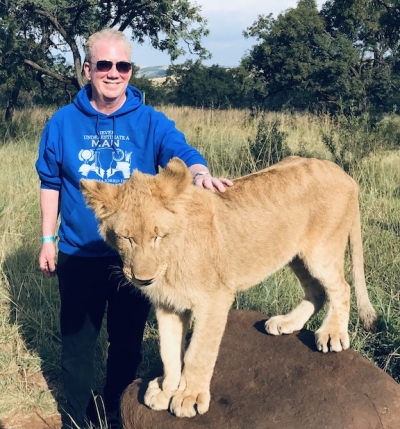
Terry and a new friend on a recent South African safari.
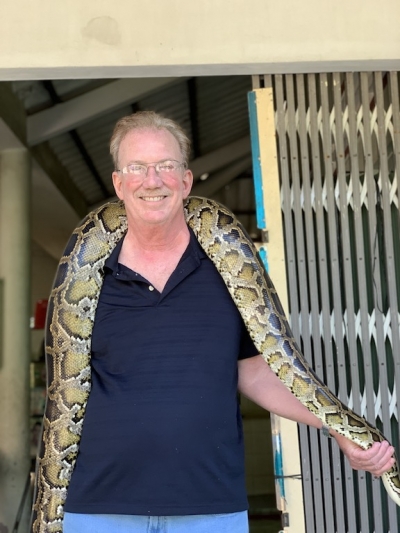
Terry visiting a family in Vietnam & their pet python.
KP: It's really a powerful track! "One Molecule Away from Madness" has the most "extended" effects of any of the fourteen pieces on the album and includes brief snippets of "Yankee Doodle," "Dixie," and "The Star Spangled Banner." I'm sure it is intentionally chaotic and intense, but how did the piece evolve?
TLN: I wanted to add a piece that employed contemporary classical minimalist techniques à la Philip Glass, John Adams, Steve Reich and others. My intent was to paint a picture of a complex modern society with an undercurrent that eventually explodes into chaos. Such was the case with the United States in the buildup to January 6, 2021. I used "The Star Spangled Banner," "Yankee Doodle," and "Dixie" to paint a picture of the badly misplaced bravado the seditionists tried to portray.
KP: It really works!
The album closes with "The Long Goodbye," which has become a nickname of sorts for Alzheimer's Disease and/or dementia. The piece expresses a variety of emotions, but mostly tenderness and sadness. Is that where the piece came from? I can't imagine anyone not being strongly affected by the piece.
TLN: This was the most difficult track to create. Although I had long completed the composition, I kept playing it over and over again until I got the intense love I have for the man into the keys. I needed this track to reflect a man who was a superlative father and a wonderful, kind, decent human being. Interestingly, for an album that begins with my genetic lineage, he was my stepfather. He married my mother when I was two years old, adopted me, and raised me along with two younger brothers and a sister. He was the only father I ever knew and the only one I ever needed. Sadly, he suffered from a gradual onset of dementia that was later diagnosed as Alzheimer’s Disease. He passed away in 2022.
KP: I'm so sorry for your loss. I have several friends in the neighborhood who have Alzheimer's and/or dementia, and it's tragic to watch people who were so capable and so vibrant slowly disappearing.
In an abrupt subject change of subject, let's find out some more about your background! Where were you born and where did you grow up?
TLN: I was born in Fayetteville, NC and raised in Miami, FL.
KP: When did you start playing the piano?
TLN: I have a family photo of me sitting at a toy piano around the age of 2. I composed ‘Child’s Play’ which was included in The Pale Blue Dot not long after coming across that photo. It was originally titled ‘Terry’s Teeny, Tiny, Toy Piano.’
KP: Cute! Are or were any of your family members musicians?
TLN: My maternal grandmother and my paternal (biological) grandmother.
KP: Which other instruments did you learn to play?
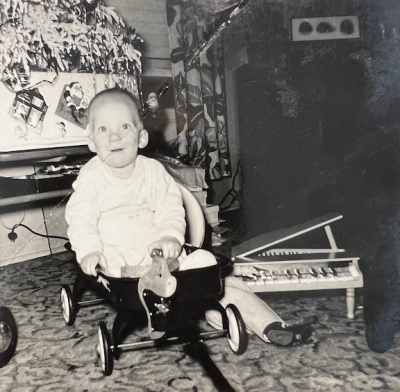
Terry and his Teeny, Tiny, Toy Piano.
TLN: Initially, anything that could make a sound including rocks, boxes, tubes, and more. Other instruments included organ, tenor sax, trombone, banjo, guitar, synthesizers.
KP: Were you a music major in college?
TLN: Yes. I was a music composition major with piano as my principal instrument.
KP: I understand you really got into electronic music as well as classical. Who or what inspired that?
TLN: Those interests began during my undergraduate years. I was like a kid in a candy store. More, more, more please!
KP: When did you start getting into internet technology?
TLN: The internet began to take off 5 years into my technology career. At first, it was a way to connect with my clients and work from home. As the technology grew, I began modernizing/rewriting/adapting legacy system technology to take advantage of the available tools.
KP: What kinds of work did you do in that field?
TLN: I started as a developer for software firms that specialized in large corporate systems. I quickly grew from a developer to a consultant, and on to creating my own systems.
KP: When did you start your own company?
TLN: 1991
KP: How long ago did you sell the company?
TLN: 2004
KP: Are you a full-time musician now or are you still doing a variety of things?
TLN: I occasionally work with clients to manage corporate initiatives. I consult in the technical/business/legal/management arena.
KP: Do you plan to tour and do concerts with Metamorphosis?
TLN: I really don’t have the desire to perform live anymore. I prefer to focus on composing and producing. I still have a lot to say!
KP: I can't wait to hear it! Who are some of your favorite composers?
TLN: Beethoven, Mozart, Brahms, Wagner, Stravinsky, Ravel, Debussy, Puccini, Shostakovich, Webern, Adams, Crumb…
KP: What kinds of things do you like to do in your spare time?
TLN: Gardening and travel are at the top of the list.
KP: If you could have any three wishes, what would they be?
TLN: 1) I hope that we learn to consider issues based on facts, and the truth that the facts bear out. We need to understand the difference in that which we wish to believe, and the actual facts.
2) I wish the we could learn to be more tolerant of each other. Working together, we can forge a better future. Continuing to work against each other could lead to the end of life as we know it.
3) I wish to fall in love with an alluring, intelligent massage therapist and live happily ever after.
KP: I love it! Is there anything else you'd like to talk about?
TLN: Not at this time. My massage therapist just arrived.
Many thanks to Terry Lee Nichols for taking the time to do this interview! For more about Terry and his music, be sure to visit
his website and his
Artist Page on MainlyPiano.com.
Kathy Parsons
May 2023

